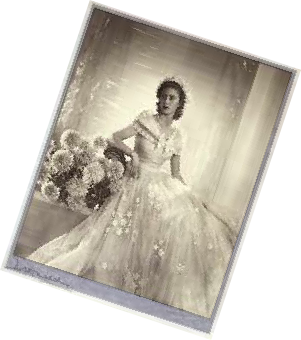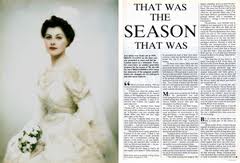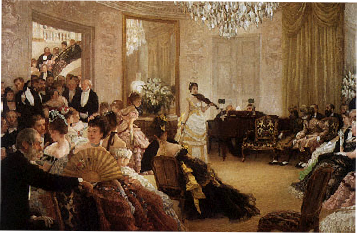Merry Gourmet Miniatures © 1988 - 2025 Designed By Bluechip Computer Support




At the age of seventeen or eighteen daughters were suddenly allowed to leave the nursery schoolroom where they had been taught, sometimes not very well, by private governesses, put up their hair and emerge into the ‘grown up world' by making their curtsy to the King and Queen at a Royal Drawing Room after which they could go on to spend the summer in a dizzying round of balls, parties and dances and attending the various events that make up the English Summer Social Calendar. This was known as ‘Coming Out' and ‘Doing the London Season'.
At this time all balls, dances and parties were private affairs, you did not hold a ball or a dance unless your London Town House had a ballroom or a big enough suite of rooms for entertaining. Every family of note held these occasions so that the daughter or daughters they were presenting would get reciprocal invitations from other families, so extending their daughters circle of friends and chances of meeting up with the brothers and male cousins, sons of aristocratic families who, having just left Eton or Harrow were also emerging on to the grown up social scene.
Early May saw the start of the round of sporting and social events that was to take up so much time and money for all those aspiring to see and be seen, with the first big event "The Derby", this horse race was extremely popular, with the working class as well as the Toffs and even Parliament adjourned for the day. The next big event was another racing occasion, "Royal Ascot", so called because it was always graced by the presence of the Royals, as it still is today.
Next, still in May, was the private viewing of the Annual Art Exhibition of the Royal Academy, followed by the first Royal Drawing Room Presentations at Court, after which all new debutantes were able to attend the various social activities and private entertainments.
A young lady had to have plenty of stamina; for they often began their day with breakfast at eight then at nine, a ride in Hyde Park, the day ended at 3.00am the following morning at a ball. During the day there would be social calls to be made, polo and cricket matches to attend, concerts, theatre matinee's, lawn tennis, luncheon and garden parties, music soirees, charity bazaars, visits to the Opera, afternoon teas, flower shows, shopping - one young lady in her first season attended 50 balls, 60 parties, 30 dinners and 25 breakfasts.
Fashionable society had many ways to amuse itself, all requiring a prodigious amount of clothes (ladies changing up to 5 times a day) and an army of servants.
The first World War in 1914 put an end to many of these events, the young men were just not there any more to participate, and when the War ended, a lot of these same young men were never to return. But the season did recover and by the end of the 1920's was almost back to its former self, now much had changed and although it carried on during the years up till the Second World War in 1939 and even after the war till Presentations were abolished in the 1950's in favour of Royal Garden Parties, looking back now many of the young ladies believe that the exclusiveness had started to decline in the 1920's, there had been much social upheaval, and after the war attitudes had changed, the younger generations were no longer inclined to respect the rigid etiquette and restrictions that had prevailed during the golden years.

The London Season in its very simple, original form started around the last two decades
of the 18th Century. The hunting season having ended in March, London saw an influx
of the landed gentry and court officials up from their country estates for a little
gaiety, gossip and social networking, lasting from April or May to the end of July,
aristocratic families saw it also as a way to introduce their young unmarried daughters
to eligible men of their own class with a view to marriage, so taking them off their
hands, and quite often progressing the social ambition of mama's (and sometime's
pappa's) at the same time by the mid 19th Century.

Coming Out - The Débutante Season

